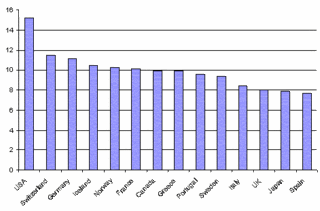This is the first article I've written of this type. Very much looking for feedback. Enjoy.The High Cost of Healthcare in the United StatesA Christian Reflection on an Immoral System
Introduction
As I begin this reflection, you should know where I’m coming from. I am a Presbyterian minister and a chaplain at Baptist Hospital of Miami. I spend quite a bit of my time each day in the Emergency Department and the Intensive Care Units. I pray with our patients and their families. I help them process the meaning of their illness or injury. I attend about 4 or 5 deaths each week. Every day I see pain up close and personally. Physical pain, emotional pain, social pain. And while I believe in the compassionate care of our hospital and our staff, including most of the physicians, I have some real problems with the system of healthcare that we’ve chosen as a nation. My problems stem from my foundational beliefs as a Christian.
Secondly, I mean this reflection to be a reflection, not an exhaustive or definitive treatment. I hope this reflection will be the beginning of many good conversations which will change all who engage in them (not least, the present author).
USA vs. the Industrialized World
As we begin, let me explain the kind of system our nation has chosen. Here, I want to be as descriptive as possible. Every industrialized society has the resources to provide adequate healthcare to its citizens. However, we have yet find a way to provide instant healthcare to everyone who needs it. That is to say, there are some people in every nation who still suffer from illness and injury simply because the healthcare resources available to others are not available to them. For example, there are horrible stories from Canada of people diagnosed with cancer who die while on a waiting list for chemotherapy.
There are two primary ways in which nations have decided to choose which people get access to healthcare resources and which do not. All industrialized countries except the United States have chosen a universal healthcare system. Healthcare is free if you can wait. Do you want to see a doctor? It won’t cost much, but you might have to wait for a very long time. If you need to see a specialist – you could wait more than a year, because everyone has equal access. First come, first serve. In the United States, we have a capitalistic healthcare system. If you can afford the money, you can get healthcare. Or, to be more realistic, if you can afford healthcare insurance, you can get healthcare, and usually pretty quickly. For those without insurance, well, too bad. Part of the reason that healthcare in the United States can be so quick, is that not everyone has access to the resources, lines are much shorter.
Ok, those are the two main systems of healthcare in the industrialized world.
[1] Now, let’s look and see how the US system is working for us.
[2]Healthcare Costs on the Rise
Healthcare costs in the United States are out of control. In 2003, we spent 15.2% of our gross domestic product on healthcare, that's an average of $5711 per person. In 2004, we were up to 16%, and some studies suggest we might hit 20% within 10 years.
[3] The country that spends the next highest amount on healthcare is Switzerland, 11.5%, or the equivalent of $5034 per person. That's a huge difference! Especially when you consider that at least 46 million Americans are uninsured. They are receiving little to no healthcare at all while all the other industrialized countries cover every person.
Healthcare costs as a percentage of GNP

So, what are we getting for spending more than anyone else on healthcare? Are we healthier? No. In fact, of the countries listed above, the United States has the highest infant mortality rate,
[4] the highest adult mortality
[5] rate and the shortest life expectancy, and only Spain has a slightly higher rate of the HIV virus.
[6]So, we are paying more and getting less as a nation. However, not everyone is paying. The people who pay are getting better treatment. More on this later. This may be true, for now. The crisis is coming, though, even for the wealthy in the United States.
The Crisis of the Free Emergency Room
As a nation, we have told hospitals that if someone shows up in the Emergency Department, they cannot refuse treatment for a lack of ability to pay. We recognize that someone who is injured deserves treatment. If you break your leg, it needs to be set right. As a society, we are willing to shoulder that burden. Or are we? When someone comes to my Emergency Room without health insurance, we treat him. Who pays for the oxygen tanks, medications, and salaries for the nurses and techs that help? The hospital absorbs the cost. By law, we have to. How can we afford to do this? We must increase the cost of the paying customers, that is, the customers with health insurance. So, a medication that costs us $50, we charge $55. How can the insurance company afford to pay in the increased price? They raise the cost of health insurance. Does this sound familiar? Are your health insurance costs increasing? In the United States, premiums for employer-based health insurance rose by 9.2 percent in 2005, the fifth consecutive year of increases over 9 percent.
[7]What happens when health insurance rates go up? Fewer people and businesses can afford insurance. What happens when those people who can no longer afford insurance get sick? They go the emergency room. And the cycle continues. More free care, higher hospital bills, higher insurance costs, fewer people insured, more free care. Nationwide, the number of uninsured citizens is climbing at an alarming rate.

In the above graph, look at the climb in the "Moderate Income" category. This is alarming. The future does not look bright.
At Baptist Hospital, our Emergency Room is packed all the time. We don’t have room to put all the people. We’re building an enormous building for a new Emergency Room. It will expand our size from 25 rooms, to 100 rooms. I hope that’s enough. Other hospitals are in similar crisis. Over 500,000 times each year an ambulance arrives at one hospital only to be sent to another one because of overcrowding, and the number is growing.
Of the many ways to provide healthcare, the Emergency Room is the most expensive. Clinics, offices, even the doctor making house calls is cheaper. The Emergency Room is the only place for poor people to receive medical care. And it is the most expensive. Why would we do this? For those with insurance, we allow them to pursue more cost-effective care. Why?
The Crisis of the Newest Technology
The right tool can make all the difference. I remember when my father showed me an oil-filter-remover. The right tool for the job makes all the difference. In healthcare, the variety of tools is almost infinite and expanding all the time. Technology marches on, and I'm glad it does. The scanners available today are amazing. Your doctor can look at a 3D image of your heart displayed in colors that tell him something useful, but I don’t know what. Those scanners are expensive, though. If you break your leg playing soccer, you'll need an X-ray. When your doctor looks at the X-ray, he'll probably be curious about something unrevealed, or maybe you'll be curious, or your brother, or your nurse. Then, you'll get an MRI scan. That will be helpful, too, but still, we could know more information. Don't you want your doctor to have all the information he could possibly have as he treats your leg? He does too -- he doesn't want to be sued. Every possible test and measurement will be taken. As technology improves, the quantity and the quality of the tests and measurements increase. That is -- there are more tests to perform, and the tests tell us more. How much information is enough? Hospitals regularly boast that they have the latest and greatest technology. They know that people will always pick the hospital with the best technology, the most, the newest, the best, if they have a choice.
The Crisis of the Pharmaceutical Companies
Therapeutic drugs cost two to three times as much (or more) in the United States as in other industrialized countries. This is true for both brand name and generic drugs. What are we getting for the higher cost? Research and development of new drugs? No. In fact, the drug companies spend few of their profits on research. Beyond research, the big drug companies regularly profit more than double most Fortune 500 companies, and recently several companies profited more than quadruple. The extra cost is not going into researching. But some research is being done. But not how you think, probably. A recent study found that 18% of research money is spent looking for drug formulas that would be a breakthrough -- that is, they would provide new help. About 85% of the new drugs developed in the United States provide no new therapeutic benefit. For example, after Pfizer introduced the drug Viagra for erectile dysfunction, GlaxoSmithKline introduced Levitra, and Eli Lilly introduced Cialis. Both Levitra and Cialis provide the same therapeutic effect as Viagra. These drugs are wildly popular and bring a big profit, without Levitra and Cialis, their respective companies would lose a large profit share, so a great deal of money is spent to make sure that the company remains strong.
Money is also spent to research slightly different formulas for brand name drugs nearing their 20 year patent protection. After 20 years, any company can make and sell the brand name formula as a generic drug. But, with a slightly different formula which has the same therapeutic effect, the companies can keep the brand-name money rolling in. So, Prilosec became Nexium in 2002. Experts say they are nearly identical, but if consumers think Nexium is better because it is newer, they might pay more money for the brand-name Nexium than a generic version of Prilosec. And they were right. We spent $458 million on Nexium in the first year! For this same reason, Glucophage, the popular diabetes drug, became Glucophage XR and Claritin becomes Clarinex.
One further point about research. The United States consumes 51% of the world's prescription drugs, and spends 58% of all the research money used to find new drugs. However, we only discover 43% of the drugs with a new therapeutic benefit. That is to say, despite the amazing profits of our drug companies, we are not pulling our fair share of new drug therapies, worldwide. Or, to say it another way, in the relationship between money spent and new drugs discovered, the rest of the world is helping us out, despite the fact that they use far less money than we.
[8]Whatever the reason for the high prices, it is not for research to help the ill and injured who wait with great expectancy for a cure or a new therapy.
Ok, there are many other problems with our healthcare system in the United States, but I would prefer to stop describing the problems here, that I may address these issues. Before I move on, let me summarize the descriptive part of this presentation. First, when compared with the rest of the industrialized world, the United States is paying far more for healthcare and yet we are still much less healthy. On average we pay significantly more per person, and yet we do not provide health to all our citizens, which is normal in the rest of the world. Secondly, we looked at the high cost of free medical care. Our society has chosen the Emergency Room as the place to send people without insurance. This has devastating effects on the cost of healthcare in general, and the system is spiraling out of control. Thirdly, while new technology is a great advantage, it has become a great economic disadvantage, too. Our attitude toward new medical technology makes the financial burden of new developments much greater than the inherent cost of the new technology itself. And finally, our economic system rewards pharmaceutical companies for a lack of innovation, and an inflation in the price of therapeutic medicines.
So now, a reflection on the immorality of our system, which is represented by these four points.
The Sacredness of Human Life
As a Christian, I am committed to the concept that human beings are made in the image of God. The creation story in the Biblical book of Genesis is quite clear about this. This becomes foundational for the Bible's presentation of ethics. For example, when the Bible talks about the immorality of murder, it commonly argues that we ought not to murder because people are made in the image of God.
[9] The sacredness of human life (over and against animal and plant life) is rooted in the fact that we are made in the image of God. People love their pets. I love dogs, myself. When my dog gets sick, we take her to the veterinarian. If the vet tells me that my dog has kidney failure and needs a transplant, I will be sad because I know my friend is near death. However, if my wife needs a kidney transplant, I will give her my kidney, if possible. I will move heaven and earth to bring her back to health. It's not the same, nor should it be. Human life is sacred because in our humanity, we reflect the nature of God in a unique way.
Health and Life
Health and life are inseparable. The scriptures talk consistently about "new life." We all understand someone who is alive but not living. As one poet resolves, "I want to live until I die." Our country declared its independence with the assertion that all people deserve "life, liberty, and the pursuit of happiness." If these things are true (and I think they are), then healthcare is different than other commodities. No one deserves a new Mercedes, but they deserve the ability to pursue a new Mercedes. But everyone deserves good healthcare. Cancer medication for a sick child is not like a new video game system. In our society, we treat the two the same. The children of the rich have access to both. The children of the poor have access to neither. But there is a moral difference between the two. Cancer medication, I believe, is a "right-to-life" issue. Because of money, thousands in our country are denied adequate healthcare and die. Far more are denied healthcare and crippled in life. Healthcare is not a commodity like any other in the free market. When you buy a new video game system, or a floor rug, or a hamburger, it does not matter much if others purchase or have equal access to these materials. Actually, one of the nice things about being able to afford a new Mercedes is driving it in the face of those who cannot afford it. That is, one of the attractive things about the new Mercedes is that access to it is limited to certain individuals.
Community health vs. Individual health
However, when we limit access to healthcare to certain individuals (i.e. the rich), health suffers for everyone, even the rich. Let me use a clear (yet admittedly far-fetched) example. Suppose the small pox virus began to spread once again. If we limit healthcare to those who can afford it, that will leave some small pox cases untreated. No matter how rich you are, you cannot protect yourself from the germs of an infected person. When you go to the school, the supermarket, the bank, the gas station, or any public place -- you never know who just left their germs on the door handle, the shopping cart, the ATM buttons. If we want to protect ourselves from infectious diseases, it is in our best interest that everyone have equal access to healthcare so that those who are infected will be free to seek medical help. We can think of real-world examples from the flu to the bird flu. We have already mastered this concept in clean water, sewers, garbage disposal, etc. In more indirect ways, this principle applies to physical health in general. Individual health is strongly related to community health.
One more example -- fat people whose health is suffering because of their weight find it easier to lose weight in the community of others with the same goal. Imagine a city of healthy people. These people are not interested in fast food. Consequently, McDonald's and KFC cannot make a profit, and have no presence in the community. What would happen if someone in the city has a natural bent toward becoming fat? It is more difficult to do so because of the health of the community. Actually, many cities in our United States are just the opposite. We foster a community of disease and illness, expecting individuals to be responsible for their own health, but if we work on increasing the health of the community, all individuals will find it easier to become healthy, including the rich.
I don't want to excuse individual responsibility. Of course, individuals should take responsibility for their own health. However, there is a dynamic relationship between the overall health of the community and the health of each individual. They affect each other. If a person is interested in improving his or her own personal health, he or she must be interested in improving the health of everyone in the community.
The Immorality of the Free Market in Healthcare
While I have alluded to this already, I want to be clear now that I believe that a free market system of healthcare is immoral. Here, you should know that I am not an economist, and I must speak in general, broad sweeping strokes, but I think as a Christian minister, I must speak to the morality issue here in conversation with economists. Perhaps in conversation we can come to a good resolution. Also, I should note that there are wonderful exceptions to the free market system. For example, Baptist Health South Florida gives away many millions of dollars in free healthcare yearly. While I am so happy for these many exceptions, I should note that they are exceptions. They are not the general rule. And I want to argue against the general rule. With those caveats, let me continue.
The free market system allows drug companies to pursue profits over health and innovation. The free market system rewards drug companies for slowing the progress of medical research. It rewards drug companies for raising drug prices as high as they want. Competition should lower prices, but it doesn't. Advertising to beat the competition has blown out of control. Increased competition has led to higher prices, not lower. If cancer drugs are a "right-to-life" issue, artificially inflated prices are immoral. Should we expect anything different from the drug companies? I think not. There is no incentive for them to lower prices, or to find innovative drugs at faster rates. I do not blame the drug companies at all. Let me repeat that. I do not blame the drug companies. I believe they are well-run companies, perhaps some of best examples of the glories of capitalism. Our American devotion to the free market system over and above human life is the problem.
Further, the free market system allows technological advances to cost far more than they should. The free market system tells us that if you can afford every test available, you should have them, which necessarily increases volume and price out of reach of the poor. Then, healthcare becomes a matter of preference rather than need. Let me offer a clear example. When I worked at St. Luke's Hospital in Chesterfield, MO, we had a wealthy patient come to our hospital for surgery. He needed a few days to recover, which went as expected. When it was time for him to go home, he told his doctor he was not feeling well, and asked for another day or two in the hospital. It was granted. He invented symptoms. We ran every test possible, and it became clear that he simply did not want to go home. As I talked with him, he told me that he lived alone. All his friends and family had died, or left him. He also told me about the young, pretty nurses that attended to his every need. He enjoyed being doted upon. His health insurance stopped paying for his hospital stay so he continued paying out of his own (very deep) pockets. About a week later, the director of security came to his room and said, "You were discharged 2 days ago. You can leave now, or you can wait 20 minutes and the police will take you away in handcuffs. It's your choice. They are on their way." He finally left.
The free market system would have allowed him to stay, even though we were constantly at capacity as a hospital, meaning that for at least one week there was someone who needed that room and the medical care associated with it, and did not receive it because he was willing to pay. Thankfully, this did not go on long, but it should not have gone on at all.
The Immorality of the Free Emergency Care
Now, let us move further into theological matters and look at the immorality of the free emergency care. Why do we mandate free emergency care? Where do we demand that independent institutions provide free care? Where else does the government dictate price controls so strongly? Especially, without limit to the number of people who can take advantage of this offer? Especially, dictating the manner in which the care must be provided (i.e. emergency care, not other forms of healthcare)? What is going on here? This seems so un-American!
Until you start thinking more deeply. As a society we have a fascination with the dramatic, the extreme, the ultimate, the horrible. For example. Think about the horror of kidnapping. Newsbroadcasters regularly feature stories of children abducted by a stranger with the intent of sexual assault, murder, ransom, or some other intent to keep the child. Sadly, about 3,000 - 5,000 of these kidnappings happen each year.
[10] These are the children who used to be on milk cartons. Child abuse is far more pervasive, though. In 2004, 872,000 children were found to be victims of abuse or neglect according the US Department of Health and Human Services. But, we don't hear about these children much. We don't want to. We are very concerned about an abducted child, but not so much about the abused child. We are concerned about the school shootings, but not about the peer abuse or bullying that goes on constantly in the schools.
We structure our cities and communities in such a way that the rich do not need to interact with the poor. Is this any different than the Jews at the time of Jesus who would not travel through Samaria so that they would not need to see a Samaritan? Today, our roads go around poor areas. The highways have fewer exits there.
In healthcare, we don't care about sick people until the images are disturbing enough. An 86 year old man with pneumonia is not too disturbing to see. But if that man has a broken leg, the bone visible, the image is disturbing enough for us to demand he be taken care of. And so we demand that his poverty must not be a hindrance. And yet we complain about the high cost of healthcare.
If you wait less than a week for an MRI, someone else must be denied the use of that machine so that you don't have to wait. That's our system. And that is immoral.
Americans seem to be especially adept at putting blinders on our eyes. Have you seen the blinders used on horses so that they can only see directly in front of them? We American use these voluntarily while carefully only facing the people we want to face. But racism still exists. Poverty still exists. Wasn't Hurricane Katrina a reminder? Jesus says, this is immoral.
The Bible scholar asked Jesus, "Who is my neighbor?" Jesus responds to him with the story of the Good Samaritan. The "good people" saw the injured man and they probably felt bad for him. But they kept walking. Are we any better?
Moving Forward
Some will say, "Are you for socialized medicine?"
"I'm not sure. I'm certainly for universal healthcare."
"What's the difference?"
"I'm concerned that everyone has equal access to healthcare. We cannot exclude some on the basis of race, religion, or income. I don't care how that happens. There may be other ways than strong governmental control."
"What other ways?"
"I'm not a politician, economist, or healthcare administrator, all of whom would be better suited to answer the question. I'm a minister, and my part is the moral question."
"But don't you think there will be 'fill in the blank' type of abuse with universal healthcare?"
"Maybe so. No system is perfect. But the abuse of a thing does not mean the thing is bad in itself. There are certainly horror stories that come from the healthcare systems of countries with universal coverage. But I think they cannot compare with the horrors of the American system."
"Is there any hope of change?"
"I'm excited about what Massachusetts is doing, levying high tax penalties to companies who chose not to offer affordable healthcare insurance to their companies. Other states, like Tennessee are working to provide a statewide coverage. There are many problems, of course. But it seems we're moving in some good directions, even if we're falling into some deep ditches on the good road."
Conclusion
All people were made in the image of God. We must protect the life and health of all people for two reasons. Primarily, people deserve access to adequate healthcare, but secondarily, the health of the community cannot be separated from the health of each individual. Therefore, if we care about our own health, we will care about the health of the community.
[1] I should note that I will not be addressing healthcare in the poor nations of the world. This topic is worthy of much discussion and reflection, but I will refrain so that we might concentrate on the topic at hand.
[2] I am proud to live in the United States of America. This country is the best place on earth, I believe. One of the reasons we are great is this -- I can write an article about what I believe needs to be changed.
[3] Borger, C., et al., "Health Spending Projections Through 2015: Changes on the Horizon," Health Affairs Web Exclusive W61: 22 February 2006.
[4] That is, newborn babies are more likely to die in the United States than in any of the other countries.
[5] Probability of dying between ages 15 and 60. When broken into sex, only France has a slightly higher adult mortality rate than the USA for men, but for women it is significantly lower. All other individual statistics favor the United States least.
[6] These numbers come from the WHO website.
[7] The Henry J. Kaiser Family Foundation. Employee Health Benefits: 2005 Annual Survey. 2005. 14 September 2005.
[8] Donald Light and Joel Lexchin, "Will Lower Drug Prices Jeopardize Drug Research? A Policy Fact Sheet" 2004. The American Journal of Bioethics 4(1):W1-W4. This article is a great introduction and has a great bibliography, too. It is also available online at http://www.bioethics.net/journal/j_articles.php?aid=61
[9] Among many places, note Genesis 9:6, "Whoever sheds the blood of man, by man shall his blood be shed, for God made man in his own image."
[10] According to the National Center for Missing and Exploited Children.
Labels: culture, Health, healthcare, morals, original writing






